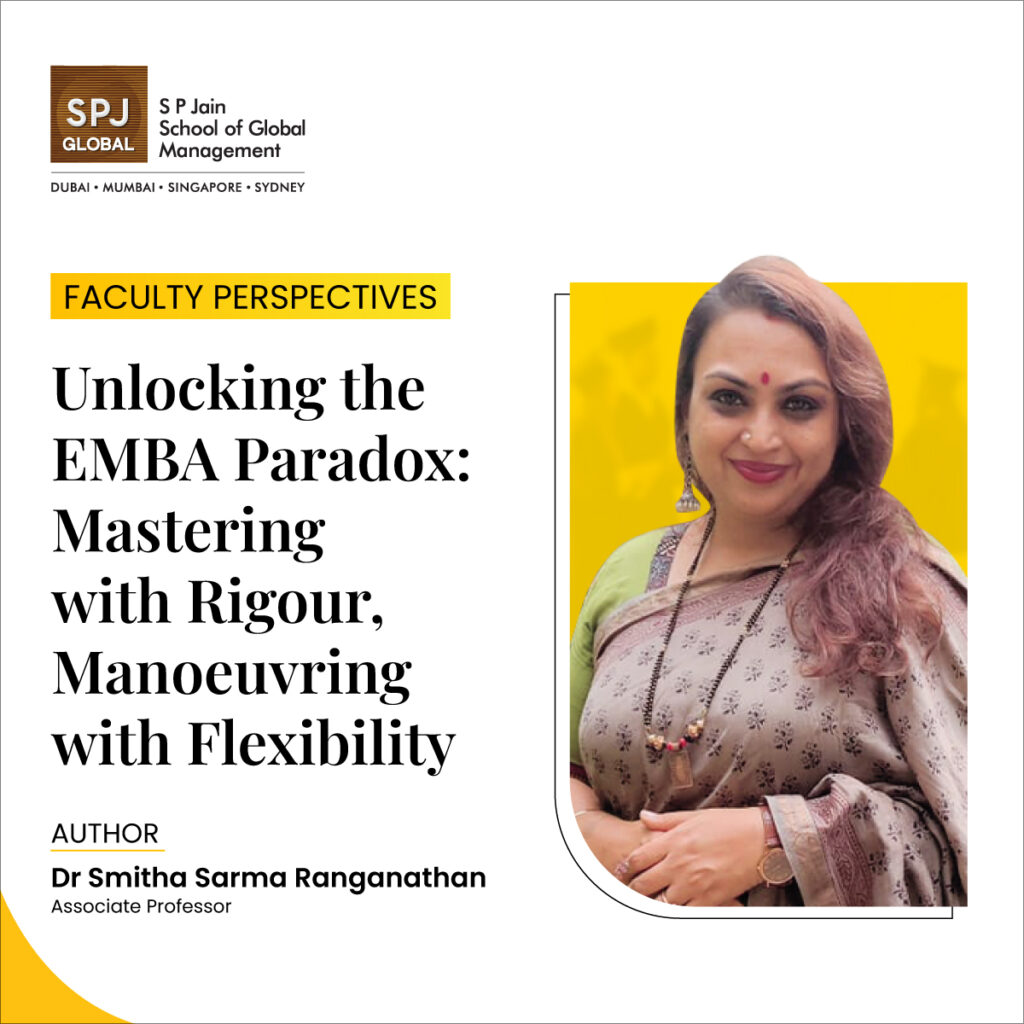Unlocking the EMBA Paradox: Mastering with Rigour, Manoeuvring with Flexibility
By Dr Smitha Ranganathan

Picture this: A seasoned professional walks into a face-to-face class directly from the airport, having managed a global meeting hours before. On another occasion, a marine engineer stationed on an oil rig adjusts his schedule to engage in online sessions during downtime. These scenarios reflect the flexibility built into modern executive education as an acknowledgment of professionals’ dynamic lives. Yet, flexibility does not mean a lack of accountability or diminished rigour. Whether solving complex case studies late at night or preparing for a challenging capstone project presentation over a weekend, participants are expected to meet high intellectual and professional excellence standards. This balance of flexibility and rigour is central to progressive EMBA programs.
Flexibility and Rigor: Appreciating the Synergy
Flexibility and rigour are often viewed as opposing forces, but they can coexist harmoniously. Institutions offering EMBA must develop methodologies that allow working professionals to thrive in a challenging academic environment while accommodating their professional commitments. This balance isn’t a trade-off; it’s a thoughtful integration that empowers participants to bring their best selves to the learning experience. This integration forms the backbone of our EMBA program’s structure at SP Jain Global.
The Core Pillars of a Balanced Approach
Defined Yet Adaptable Learning Journeys: Our EMBA programs have a clear structure, including modular formats and milestones. However, they remain adaptable to our participants’ diverse professional realities, allowing them to plan and participate meaningfully while ensuring a consistent learning journey.
Real-World Relevance: We have had entrepreneurs coming to class seeking a means of solving their go-to-market strategy or an operations executive wanting to leverage digital tools more powerfully. These diverse goals highlight the deeply practical nature of our curricula. From case studies to simulations, the pedagogy mirrors real-world challenges and ensures immediate applicability. Additionally, we believe in practical theory: all our faculty are practitioners of cutting-edge methodologies, bringing unparalleled relevance and expertise into the classroom.
Accessible and Engaging: Consider a sales leader in Asia, balancing regional responsibilities, who joins an online session after a long day yet contributes as effectively as their peers attending in-person classes. Accessibility means providing the tools and platforms to enable seamless participation while maintaining the same expectations for accountability, engagement, and performance in every learning mode.
Academic Excellence Coupled with Professional Rigor: I recall one of our participants—a healthcare consultant—who remarked how our Applied Strategy project demanded every ounce of their analytical ability and creativity to pilot their new venture. This rigour is intentional and designed to stretch participants intellectually and professionally. Every program element pushes participants beyond their comfort zone, from challenging coursework to discussions that provoke critical thought.
Collaborative Learning Communities: Our EMBA learning journeys are punctuated with powerful stories of collaboration.In one cohort, an airline executive collaborated with a fintech entrepreneur to design a business model that leveraged blockchain for supply chain management. Peer-to-peer interaction like this goes beyond classroom discussions; it builds a rich ecosystem of shared knowledge and diverse perspectives, fostering insights that no textbook can offer.
Cross-Cultural and Cross-Functional Intelligence: A hallmark of effective executive education is the cultivation of cross-cultural and cross-functional intelligence. Participants often work in diverse teams, navigating differences in work styles, decision-making approaches, and cultural contexts. For example, a finance professional from Europe may team up with a head chef of an acclaimed restaurant in the Middle East to solve a strategic challenge, blending analytical precision with creative problem-solving. These experiences prepare leaders to thrive in global, multicultural environments and adapt their approaches to varied contexts.
Redefining Outcomes of Executive Education
Executive education is no longer just about acquiring skills; it is a transformative experience that enables individuals to rethink the way they approach challenges and opportunities. At SP Jain Global, this journey is designed to help professionals move beyond theoretical knowledge to real-world impact. Flexibility here doesn’t mean passivity, and rigour is not about adding pressure for its own sake. Instead, learning is deliberate, reflective, and deeply engaging.
Graduates of programs that balance flexibility and rigour emerge with more than new tools and strategies; they leave with a renewed sense of purpose and clarity. They learn to zoom out to see the bigger picture, navigating complex environments with strategic insight and confidence. They build enduring networks with peers and mentors, creating a community supporting their growth long after the program ends. Above all, they develop a mindset of continuous growth—an ability to adapt, innovate, and inspire in any context. These are not just academic outcomes; they are life-changing transformations that redefine careers and personal trajectories.
About the Author
Dr Smitha Sarma Ranganathan, Associate Professor at SP Jain Global, has over 24 years of expertise in advertising, brand communication, and digital strategy. A recipient of numerous awards, she advises social enterprises in the Indian handloom sector and contributes to leading global publications, focusing on contemporary marketing challenges.


